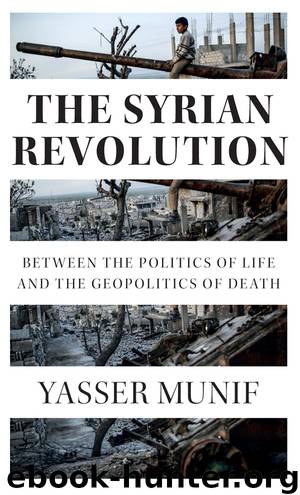The Syrian Revolution by Yasser Munif;

Author:Yasser Munif;
Language: eng
Format: epub
Publisher: Book Network Int'l Limited trading as NBN International (NBNi)
IS THE CURRENT REVOLT DECOLONIAL?
The current revolt is producing its own nationalism, while at the same time countering the despotic ideology of the Baath party. As such, two nationalisms are competing for dominance. The first one is popular and anti-dictatorial, while the second is official and claims to be anti-imperialist and anti-Zionist. The first resonates with the nationalism of the Great Syrian Revolt of the 1920s, while the second is the heir of pan-Arabism of the 1950s and 1960s. The first was experimental, while the second followed a scripted program. The former’s main objective was decolonization; the latter’s goal was, and remains, autocratic rule. Nationalism of the 1950s and 1960s was influenced by Nasser’s centralization of power, but had a much less ambitious developmentalist goal.
The current uprising is producing a new nationalism that strives to delink gradually from the state-centric nationalism of the Baath party and reinvent itself, in part, by reconnecting with the nationalism of the early twentieth century. The process of delinking is delicate and risky. If it is performed too slowly, it could be co-opted or subverted. However, the rejection of state-centric nationalism, while desirable, could leave a discursive space that sectarian or despotic groups could occupy. This explains why supra-nationalist and infra-nationalist groups with Islamic, tribal, and ethnic identities dominate the scene. Due to these competing identities, which are functioning at the local and trans-local levels, popular nationalism is facing a major challenge as it attempts to counter state nationalism.
Popular nationalism, which this chapter investigates in more depth in Manbij, should be understood as a dynamic cultural praxis. It could morph into a Manichean ideology; it could also evolve into a Fanonian new humanism. In addition, it could be overtaken by other competing ideologies. Most opposition leaders are detached from people’s everyday realities. They are mostly busy producing centralized and exclusive narratives that are in many ways a replica of the regime’s ideology.31 The nationalism that protesters are producing with their bodies, emotions, dances, and various praxes is promising, but has been gradually marginalized.32 Popular nationalism was dominant before the militarization of the revolution, and stayed influential until the end of 2013. It is also competing with transnational Islamism in the liberated regions such as Manbij.
In the following section, popular nationalism is explored in the context of the liberated city of Manbij between 2011 and early 2014. In those liberated regions, nationalism is deployed to solve everyday problems. As Fanon explains: “The living expression of the nation is the moving consciousness of the whole of the people; it is the coherent, enlightened action of men and women.”33 Against the Manichean worlds that both the regime and a sizable segment of opposition groups are attempting to impose on Syrians, people are resisting by producing polyphonic narratives. Unlike official nationalism, decolonial nationalism is plural. It is based on a politics of rupture from the nationalism of the 1960s and a critical rediscovery and reconnection with the nationalism of the 1920s.
Download
This site does not store any files on its server. We only index and link to content provided by other sites. Please contact the content providers to delete copyright contents if any and email us, we'll remove relevant links or contents immediately.
| Arms Control | Diplomacy |
| Security | Trades & Tariffs |
| Treaties | African |
| Asian | Australian & Oceanian |
| Canadian | Caribbean & Latin American |
| European | Middle Eastern |
| Russian & Former Soviet Union |
The Secret History by Donna Tartt(16606)
The Social Justice Warrior Handbook by Lisa De Pasquale(11485)
Thirteen Reasons Why by Jay Asher(7780)
This Is How You Lose Her by Junot Diaz(5753)
Weapons of Math Destruction by Cathy O'Neil(5029)
Zero to One by Peter Thiel(4816)
The Myth of the Strong Leader by Archie Brown(4785)
Promise Me, Dad by Joe Biden(4440)
Stone's Rules by Roger Stone(4412)
Beartown by Fredrik Backman(4403)
How Democracies Die by Steven Levitsky & Daniel Ziblatt(4392)
The Fire Next Time by James Baldwin(4336)
100 Deadly Skills by Clint Emerson(4070)
A Higher Loyalty: Truth, Lies, and Leadership by James Comey(4024)
Rise and Kill First by Ronen Bergman(4008)
The David Icke Guide to the Global Conspiracy (and how to end it) by David Icke(3875)
The Farm by Tom Rob Smith(3869)
Secrecy World by Jake Bernstein(3773)
The Doomsday Machine by Daniel Ellsberg(3725)
